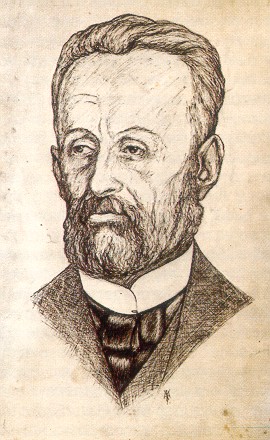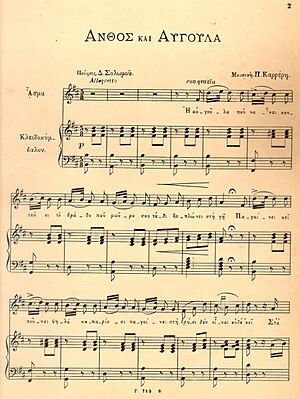Pavlos Carrer facts for kids
Pavlos Carrer (also known as Paolo Carrer; Greek: Παύλος Καρρέρ; born May 12, 1829 – died June 7, 1896) was a Greek composer. He was a key figure in the Ionian art music school. He was the first composer to create Greek national operas and songs based on Greek stories, words, and melodies inspired by traditional Greek folk music.
Contents
Biography
Pavlos Carrer came from an important family on the island of Zante. He studied music there with Italian teachers like Giuseppe Cricca and Francesco Marangoni. He might have also studied in Corfu with Nikolaos Mantzaros. Carrer had a natural talent for music. In the 1840s, he wrote his first small pieces. His short opera piece, Il pellegrino di Castiglia, became popular when it was performed at the ‘Apollon’ Municipal Theatre in Zante.
In 1850, when Italy was uniting, young Pavlos Carrer moved to Milan. Milan was the main city for opera in Europe at that time, though it was controlled by Austria. He went there to study music more deeply. He took private lessons with Raimondo Boucheron, Pietro Tassistro, and Giuseppe Winter. In the same year, he performed his first instrumental music at the ‘Carcano’ theatre. He also wrote music for a ballet called Bianca di Belmonte.
With help from Francesco Lucca, a powerful Italian music publisher, Carrer presented his first opera, Dante e Bice, in August 1852 at the ‘Carcano’. This opera was about the Italian poet Dante Alighieri, his love for Beatrice Portinari, and his political activities. The Austrian police were reportedly annoyed by its political messages. The next year, Carrer worked on a funny ballet called Cadet, il barbiere, which didn't do very well. However, that same year brought him great success with his three-act opera, Isabella d’Aspeno. It was first shown in Corfu and then had many successful shows in Milan. This opera is considered an important work in Italian opera of the mid-1800s. It is even thought to be an early version of Verdi’s famous opera, Un ballo in maschera.
Carrer's success in Milan continued with his big opera La Rediviva. It was very popular when it first opened at the ‘Carcano’ in January 1856. This success continued in other Italian cities and in Corfu. While in Italy, Carrer also wrote music for small concerts, like piano and flute versions of opera songs, dances, and music exercises.
Carrer dreamed of creating Greek national music and becoming the first Greek national composer. In 1857, he returned to Zante. He worked as a conductor and managed local theaters. He also taught music and married Isabella Giatrà, a talented singer who performed his works. At this time, he wrote his first national opera, the four-act Marco Bozzari (1858–60). He also wrote many art songs with Greek lyrics, including the famous folk-style song ‘Ho Gero Dēmos’ (Old man Dēmos). This song was included in his opera.
Marco Bozzari had some troubles because of its patriotic and anti-Ottoman content. It finally opened in Patras in April 1861. This opera is seen as Carrer's most famous work and was the most popular Greek opera in the 19th and early 20th centuries. It was performed over 45 times! The opera was first written with Italian words, but it was soon translated into Greek. When performed in Greek, it often made the audience very excited.
Carrer also wrote two other national operas:
- Kyra Phrosyinē (Lady Phrosyinē), which had an Eastern feel and was performed in Zante in November 1868.
- Despo, a heroic opera, which opened in Patras in December 1882.
Both of these operas are available on CD today.
Besides his national operas, Carrer kept writing operas in the Italian style. One example is Fior di Maria (staged in Corfu in January 1868). He also made big steps towards a more realistic musical style with his historical opera Maria Antonietta (opened in Zante in January 1884).
A very special opera he wrote was Marathōn-Salamis. This was an ambitious four-part opera (written around 1886–8). It mixed a Classical Greek theme with a new musical style. Carrer never saw this opera performed. It was first shown in Athens 115 years after he wrote it by the Greek National Opera.
Carrer also left two projects unfinished: the national-style opera Lambros il brulottiere (around 1886) and the operetta Conte Spourgitis (Count Sparrow) (1886–7). There is also a lost opera called Don Pigna.
Pavlos Carrer was one of the most popular composers in 19th-century Greece. He also gained a good reputation in Italy. He kept up with new ideas in European opera and always tried to improve his music. His music shows Italian influences, especially from Verdi. However, Carrer's music has its own unique style. He worked hard to bring Greek national colors into his creations. Pavlos Carrer played a leading role in creating Greek national opera in the Ionian islands in the mid-1800s.
Works
- Stage Operas and Ballets
- Il pellegrino di Castiglia (short opera piece), Zante, around 1849–50 (music lost)
- Bianca di Belmonte (ballet), Milan, December 1850 (music lost)
- Dante e Bice (historical opera), Milan, August 1852 (music lost)
- Cadet, Il barbiere (comic ballet), Milan, June 1853 (music lost)
- Isabella d’Aspeno (tragic opera), Corfu, February 1854
- La Rediviva (lyric tragedy), Milan, January 1856
- Marco Bozzari (lyric tragedy), Patras, April 1861 (music lost)
- Fior di Maria, or The Mysteries of Paris (opera), Corfu, January 1868
- Ē kyra Phrosynē (Lady Phrosynē) (opera), Zante, November 1868
- Maria Antonietta (historical tragic opera), Zante, January 1884
- Despō, ē hēroïs tou Souliou (Despo, heroine of Souli) (opera), Patras, December 1882
- O Psōmozētēs (The Old Beggar) (opera scene), Athens, March 1887
- Marathōn-Salamis (opera), Athens, February 2003 (performed long after he wrote it)
- Unfinished operas: Lambros il brulottiere (around 1879–85), Conte Spourghitis (Count Sparrow) (around 1886–9)
- Lost opera: Don Pigna
- Other Vocal Music
- Sacred music: Orthodox liturgy, hymns, and masses.
- Songs with orchestra: Many songs like "O Demos," "The Soldier/War Song," "Flowers," "The Flower Girl," and "Royal Anthem."
- Songs with piano: Many songs for one voice and piano, including "The Condemnation of the Klepht," "Old Demos," "The Moon," "Maria," "The Flower and the Dawn," "The Orphan," "Mother and Child," "Tell me," "The Kiss," and "Hymn to the Fatherland."
- Instrumental Music
- Piano solo: Many original pieces, paraphrases (versions of other music), and transcriptions (music written for a different instrument).
- Other works: Funeral March from La rediviva (for band), "Din-don polka" (for instruments), marches for band, waltzes for flute, and many transcriptions for flute and piano.
- Main Publishers
- Canti, Féxis (Athens), Lucca (Milan), Veloudhios
Recordings
- Pavlos Karrer, Despo, Markos Botsaris (parts) (LP released by the 'Friends of the Museum of Solomos and Distinguished Zantiotes', Zante, 1989) EMI MT15117
- Paolo Carrer, Frossini (Lyra, ML0669/70, 1998)
- Paolo Carrer, Despo (Lyra, CD0792,2002) (this recording includes, besides Despo, the prelude to "Isabella d'Aspeno", the overture to "Maria Antonietta", "Gero-Demos", three songs for soprano and orchestra and a polka for orchestra)
See also
- Ionian School
 | Georgia Louise Harris Brown |
 | Julian Abele |
 | Norma Merrick Sklarek |
 | William Sidney Pittman |



